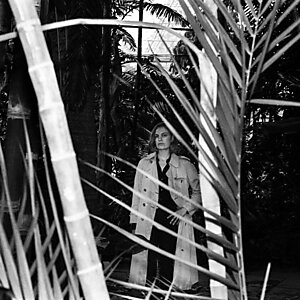Technology + Teamwork
Technology + Teamwork
country: UK
genre: Electronic
styles: Experimental, Dance, Pop

We Used To Be Friends
 LP
LP
Spotify Bandcamp Soundcloud
Reviews and Comments
If there were such a thing as analogue AI, it might birth something like Technology + Teamwork. The debut from the pair – Sarah Jones and Anthony Silvester, who previously collaborated as part of late-‘00s post-punk outfit XX Teens (and if that first name sounds familiar, yes it’s she of New Young Pony Club, and most infamously, the powerhouse drummer behind Harry Styles’ live presence) – is both weathered and chrome, like lost tapes spanning decades of genre, gathered by a time traveller and burned into an alien Walkman.
Anthony Silvester and Sarah Jones have taken their time in creating their debut album as T+T – a very late gift from 2000s indie that would have never fitted in that world
Sarah Jones and Anthony Silvester’s debut brings experimental electro-pop and hyperpop, new wave, R&B, disco and more, from brilliant bangers to the oddball and bizarre, and influences from West Coast 60s synthesis movement to late 70s and early 80s Cabaret Voltaire with little dash of Yello. The pair have a rich experience in music, performing with everyone from Hot Chip, Harry Styles to Bloc Party. Jones has had a lasting percussive presence across much alternative UK pop music from her own solo project Pillow Person to playing on records by Puscifer and Kurt Vile. Silvester has performed in art galleries across Europe including: Fridericianum in Kassel, Kölnischer Kunstverein in Cologne, and Vleeshal in Middelburg, as well as providing sound design and composing work for several art films. So it’s no wonder that after a series of singles, their much anticipated debut is truly eclectic. Standouts include the title track, previously a Song of the Day here, You Saw Something In Me, Moving Too, And So…, Big Blue, and The Good Way. Experimentalism comes further with various surprising twists, such as with the soulful R&B of K +B, but also the indefinably odd Amsterdam and particularly the bubbling, resonantly strange Oh Oh that precedes the closing piano power-ballad style closing track, What A Year. Never predictable, this is vibrant work rich in influences with many original twists, and among most arresting and fascinating releases of 2023 so far. Out on Good Way Records.
Technology + Teamwork’s fizzling synths, interweaving textures and punchy rhythms are beguiling on their long-awaited debut album We Used To Be Friends. However, at the heart of it all it’s the connection between the group’s two members, Anthony Silvester and Sarah Jones, the friendship the much-travelled duo have managed to maintain for nearly 15 years and a showcase of the slow-burning construction of the electronic world that they’ve surrounded themselves with.
We Used To Be Friends is ultimately the tale of two storied artists in their own right, holding onto each other through personal and career twists and turns, relocations and broader movements through respective phases of their lives. Silvester and Jones first met and then collaborated as part of biting post-punk five-piece XX Teens in 2008, eventually breaking off to forge their own path together even as the latter’s demand as a drummer grew. Performing with everyone from Hot Chip, Harry Styles and Bloc Party among many others, Jones has been a constant percussive presence across the sphere of alternative UK pop music – she’s also found time for her own solo project Pillow Person and played on records by the likes of Puscifer and Kurt Vile. Silvester meanwhile has performed in art galleries across Europe including: Fridericianum in Kassel, Kölnischer Kunstverein in Cologne, and Vleeshal in Middelburg, as well as providing sound design and composing work for several art films.
Technology + Teamwork is the constant throughout all of that though. “Technology + Teamwork's name perfectly describes how we work” Silvester explains. “Sometimes the teamwork is between each other and sometimes it’s between us and the technology.” Although going by the name Technology + Teamwork as far back as 2014, two events conspired that pulled the project into focus for the pair of them: firstly, Silvester spent a year constructing a soundproof studio shed on the border of London and Essex where he lives. Secondly, inevitably, the pandemic brought the globe-trotting Jones back home to just seven miles away from her long-time collaborator and friend. “We probably hung out more than we had for a few years” says Silvester. “Also, after all her Pillow Person releases Sarah had gotten really good with recording vocals and knowing what did and didn’t work and had a really good home studio set up. We still worked separately though, exchanging ideas via email and WhatsApp.” As with many artists through 2020 and early 2021, working separately was a new necessity that they were forced to adapt to. However, it became clear that there were creative benefits to it. “It really changed our sound and our sounds became a lot more focused as a result” Jones says. “I wanted to use the same ideas of improvisation that I might use while playing the drums for myself and apply that to melodies and lyrics.” The album bristles with hyperpop modernity. You can hear it in the manipulated vocals most prominently on Big Blue’s disco strut and on Moving Too’s heady mix of pitched up voice and burrowing sub bass. However, the pair also looked to San Francisco and the West Coast synthesis movement of the 60s, Silvester inspired by the likes of Suzanne Ciani and Don Buchla. The plaintive lo-fi and melancholy of Amsterdam incorporates Mutable Instrument’s Marbles by Émilie Gillet which – inspired by Buchla’s own synthesis work – outputs random voltages to give the track an air of unpredictability. It’s something that occurs throughout the album, the duo revelling in the happy accidents that disrupt the flow of their hook-laden pop.
“The ‘Buchlian’ ideas of music having randomness and uncertainty, completely freed us up” Silvester explains. “It felt a bit like having more members in the band, machines that didn't do what you expected or intended.” Perhaps more subtly, is the influence of 17th and 18th century Baroque music, with Silvester drawing a line between it and the 90’s R’n’B he and Jones both love – exemplified perhaps best on K+B’s percussive claps and sultry grooves. The portentous juddering synthpop of the title track, meanwhile, alludes specifically to Handel’s Sarabande. It’s typical of an album that only needs a scratch of its seemingly glossy surface to unearth a myriad of contorted touchstones and reference points that’ve fermented beneath it. Thematically there’s an anxious sense to the record, with tracks often balancing above a quiet sense of unerring tension even at their most bombastic. Moving Too is the result of an existential doubt that hit Silvester while out cycling, with the outro refrain "it's not enough to die you also have to be forgotten" a take on something Samuel Beckett once said. These worries are echoed on the album’s closing track What A Year, which borrows a lot of lines from the late drag performer and fashion designer Dorian Corey including the grimly defiant "you're gonna leave your mark somewhere in this world just by getting through it”. Those clouds offer a counter point to We Used To Be Friends, but then isn’t that what great pop albums do? Technology + Teamwork undoubtedly love the craft of the hook and the song, but they always position themselves left of centre, prepared to scuff things up, pull something out of shape or manipulate something to leave it sounding warped. Much like their friendship, nothing here is particularly linear – and it’s all the better for it.
STAFF COMMENTS
Barry says: Big tip here for fans of Confidence Man / ITOP, with snappy synths and killer vocals perfectly interwoven, resulting in a hypnotic adventure perfectly pitched for the darkened dancefloor.
latest releases









